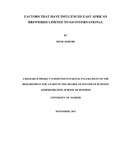| dc.description.abstract | Success in international competition demands that firms translate domestic positions into
international positions. Firm is influenced to enter international markets resulting to
international integration of markets is facilitating decentralization by reducing the
economic costs of smallness. Companies wishing to pursue a long-term position in a
foreign market need to be more proactive in their approach to market entry by becoming
directly involved. The objective was to determine factors that influenced East Africa
Breweries Limited to go into international. This research adopted a case study approach.
A case study enabled the researcher to have an in-depth understanding of the factors that
have influence East Africa Breweries Limited to go international. The researcher used
both primary and secondary data. Primary data was collected using self-administered
interview guides while secondary data was collected by use of desk search techniques
from published reports and other documents. The interview guides consisted of openended
questions. The study population was 35 interviewees who included the managers
across all departments working in East Africa Breweries Limited. From the findings, the
study established that when EABL wanted to start competing globally, the strategic
decision on entry was made and it fundamentally benefited the firm, including its
operations and its management. The study established that EABL had plans to develop
new product policy and strategy that is sensitive to market needs, competition, and
company resources on a global scale. Several reasons influenced the firm to
internationalize in emerging markets. These include to gain a greater market opportunity,
maximize on profits of the company and to expand and have a greater feeling of the
market. At the most basic level, firms’ motivations to carry out FDI falls under resource
seeking, market seeking, efficiency seeking, and strategic asset seeking categories. The
study found that the need to originate, produce, compete and market beer industry
products worldwide influenced EABL to go international. The choice of the correct entry
mode for a particular foreign market is a critical marketing decision. The study concludes
that survival and success of an organization would occur when the organization creates
and maintains a suitable match between its strategy and the environment and also
between its internal capability and its strategy. The process by which resources and
capabilities are transformed into a competitive advantage for the organization that has
gone international follows the key elements in the process of international market entry
and expansion for production firms, such as the EABL | en |

